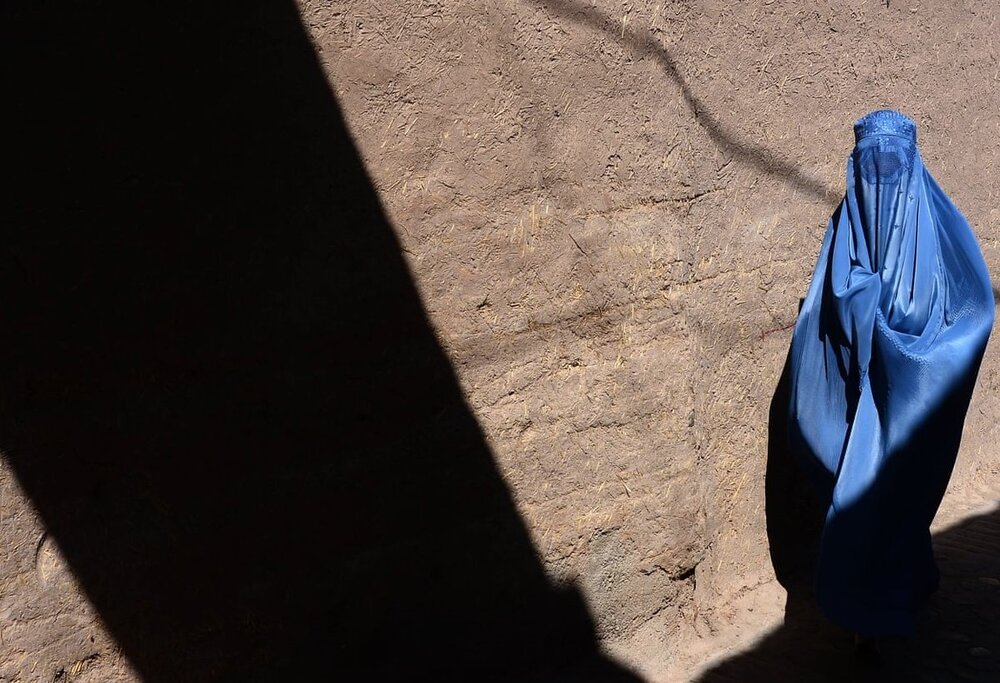Iran (IMNA) - Mahrokh, who was born in Afghanistan, came to Iran two years ago at the beginning of the Taliban's ascent to power. Her trip to Iran was an arduous one from the start.
"Desperate to board a plane to safety, we were at the airport. There were also American soldiers there, getting on their plane. Suddenly, in the middle of the mayhem, a soldier gave a yell and ordered everyone to move. I experienced a sharp ache in my side of the stomach at that same instant," Mahrokh recalls.
An American soldier had shot her, but she didn't have time to heal from the injury. She and her family were compelled to leave their homeland immediately as Shias residing in Kabul before the Taliban took over the city.
Soon after, despite her new wound, the little girl Mahrokh set off on a two-month trek with her family in search of a safe refuge.

Before departing for Tajikistan, they were joined by another family consisting of five members, in addition to her parents, younger brother, and two younger sisters. At the border, though, they encountered push-bac that forced them to change their route in the direction of Uzbekistan. Sadly, they ran into identical problems with border patrols there as well.
They had to trust human traffickers with their lives, so their next trip was much riskier. Even though Mahrokh describes their perilous voyage into Iran as a frightening route, she can talk about her unfathomable struggles while maintaining a strong grin on her face.
"We had human traffickers with us as we attempted to enter the border. We were forced to walk for at least five days to get to the Iranian border in Afghanistan. We ate only one meal a day, which was often hard bread and yogurt, and we didn't get any sleep," Mahrokh remembered.

The small girl claimed that human traffickers detested children. Because we made the team go more slowly and the children were always weeping, they didn't like us. They were able to persuade some parents to abandon their children, or else they would take toddlers and babies and discard them as though they were disposable. We came to a valley once where the bodies of deceased children were piled up.
Mahrokh first informed about Hanifa, an unauthorized school that is a hidden gem, from the children where she resided. A group of committed and enthusiastic female teachers in their 20s and 30s operate the amazing school. Mahrokh found a world of opportunities at Hanifa. She might learn to write, become an expert mathematician, and even pursue her passion for handcrafting here without having to worry about money.
Hanifa can only exist because of the kindness of benevolent people. The committed Hanifa founders converted Conex containers into classrooms in a tiny leased space despite having little money to their name.
Hanifa School founder Nastaran Daneh-Kar stated, "We try to give these kids everything someone in their age but with a privileged background would have."

She spends nearly every day with the kids together with her coworkers. Approximately 80% of the children they deal with are not enrolled in any school; either their families do not want to send them to school, or they do not have the necessary paperwork.
Daneh-Kar, nevertheless, thinks she can turn things around. Her goal is to provide lifelong learning opportunities for the children at her school.
These children receive instruction in more than simply writing and math. We work to instill confidence in them and provide them with the skills necessary for adult society. Although Hanifa is just temporary, we want the effects to last forever.
Daneh Kar was also a little lost when asked why she had dedicated her life to aiding young immigrants. She informed me that she had a strong bond with the children at Hanifa and that her main hope in life was to see them all in a better place, even if she was not sure why.
Hanifa is more than simply a school; it's a place that gives Mahrokh and children of similar ages a feeling of support and community.
Mahrokh declared, "I want to become a teacher and do for others what others here have done for me." "They completely transformed my life, and I will always be grateful to them."

The teachers here have the same dream: that the pupils will mature and take over as their teachers. They want Hanifa's legacy to live on so that other children may discover their true place where they belong and learn to dream big.
All children on the earth should have the freedom to choose what they want to do with their lives, regardless of their background. Impoverished people are given a second start at life in places like Hanifa.


Your Comment